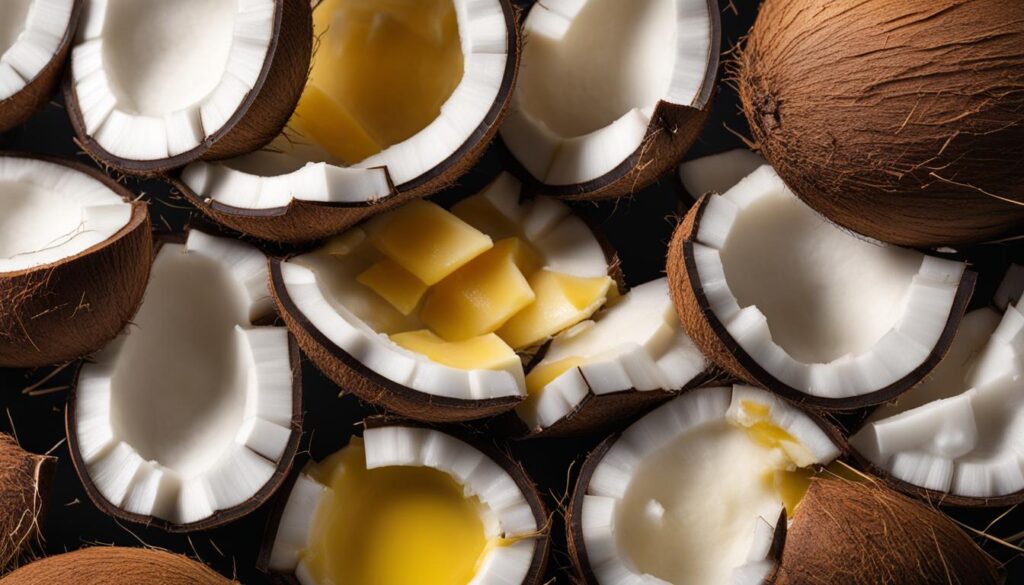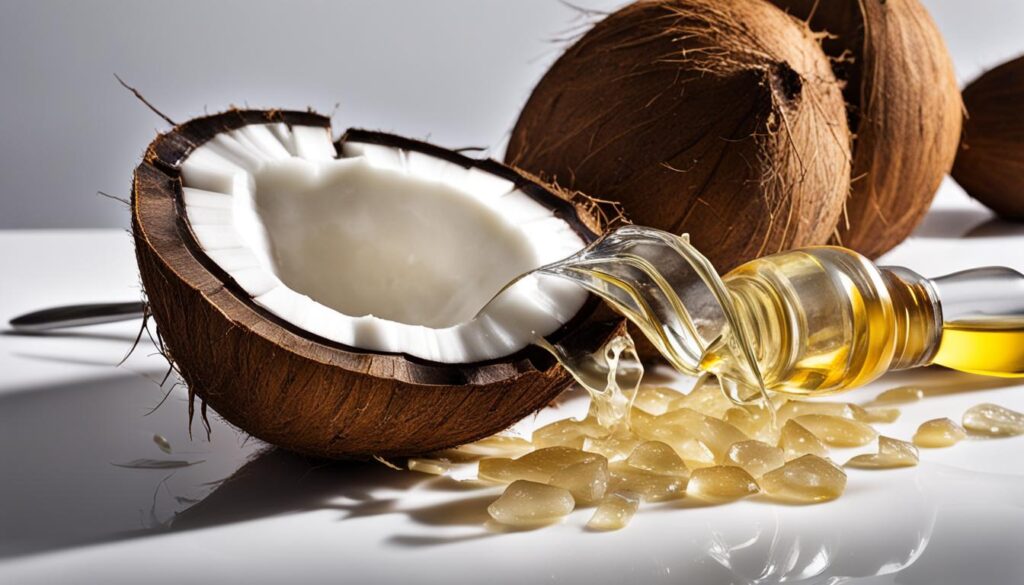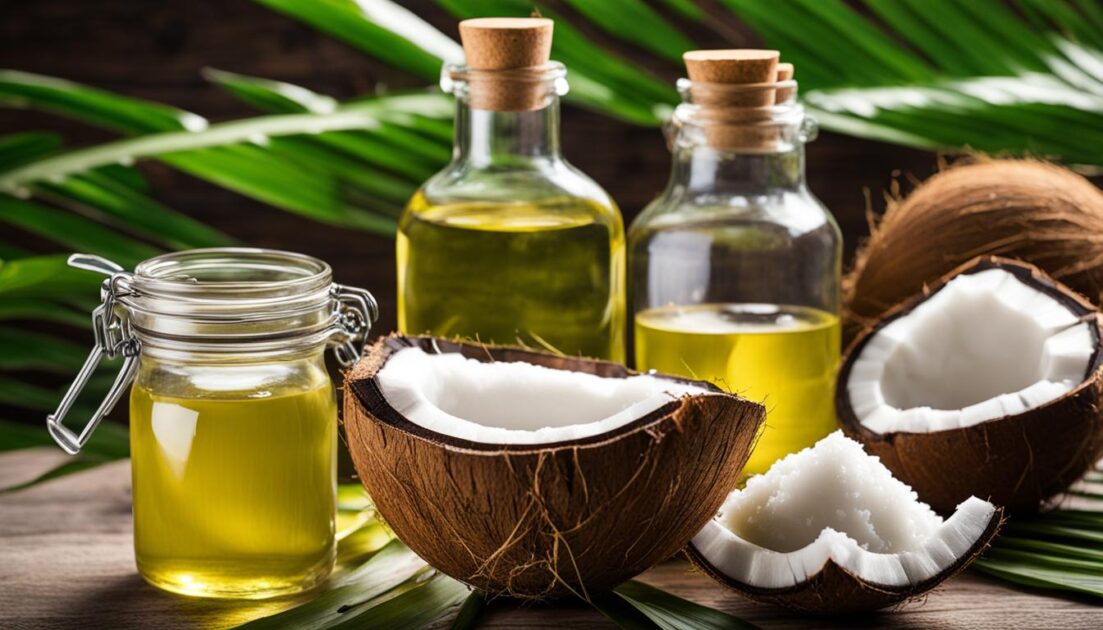Coconut oil has gained immense popularity as a versatile ingredient that offers numerous health benefits. Its holistic and natural properties have made it a go-to choice for various applications, ranging from skincare to haircare to cooking. In this article, I will explore the top health rewards of coconut oil and how it can enhance overall well-being. We will delve into its potential benefits for skincare, haircare, weight management, and more.
Key Takeaways:
- Coconut oil is a natural remedy with a wide range of health benefits and uses.
- It can be used in skincare routines, haircare treatments, and as a cooking oil.
- Coconut oil may aid in weight loss, lower cholesterol levels, and improve digestion and immunity.
- Its unique properties make it an ideal choice for moisturizing the skin and nourishing the hair.
- When used in moderation, coconut oil can be a valuable addition to a healthy lifestyle.
Understanding Coconut Oil: A Complex Yet Beneficial Fat
To fully understand the benefits of coconut oil, it is essential to delve into its composition. Coconut oil is a unique fat that offers a range of health benefits. Let’s explore the surprising composition of coconut oil, debunk myths surrounding saturated fat and heart health, and explain the role of medium-chain triglycerides (MCTs) in this versatile oil.
The Surprising Composition of Coconut Oil
Coconut oil is primarily composed of saturated fat, making up about 90% of its fatty acid profile. This high saturation level is what gives coconut oil its solid state at room temperature. It’s important to note that not all saturated fats are created equal. Coconut oil contains unique types of saturated fatty acids called medium-chain fatty acids.
Medium-chain fatty acids found in coconut oil include lauric acid, caprylic acid, and capric acid. These fatty acids are metabolized differently in the body compared to long-chain fatty acids, such as those found in other dietary fats. The presence of these medium-chain fatty acids contributes to the unique properties and potential health benefits of coconut oil.
Debunking Myths: Saturated Fat and Heart Health
In the past, saturated fat has often been associated with negative effects on heart health. However, recent research has challenged this belief and shed new light on the potential benefits of certain types of saturated fats, including those found in coconut oil.
While it is true that consuming excessive amounts of saturated fat from sources like red meat and processed foods can increase the risk of heart disease, not all saturated fats have the same impact. The saturated fat in coconut oil consists mainly of medium-chain fatty acids, which have been shown to have a neutral or even positive effect on heart health.
It’s important to note that coconut oil should be consumed in moderation, as it is still a source of calories and saturated fat. Balancing the intake of various types of fats is crucial for overall heart health.
Medium-Chain Triglycerides (MCTs) Explained
One of the key components of coconut oil that sets it apart from other fats is its high content of medium-chain triglycerides (MCTs). MCTs are a type of fatty acid structure that is easily absorbed and rapidly metabolized by the body. This efficient metabolism makes MCTs a valuable source of quick energy.
Unlike long-chain fatty acids, MCTs are transported directly from the digestive system to the liver, where they are converted into ketones. Ketones are an alternative energy source that can be used by the brain and muscles. This unique property of MCTs has led to their use in therapeutic diets like the ketogenic diet, which aims to increase ketone production in the body.
Research on MCTs suggests that they can increase energy expenditure, promote feelings of fullness, and potentially aid in weight management. Additionally, MCTs have been linked to potential benefits for brain health and cognition.

Nutritional Profile and Health Benefits of Coconut Oil
Coconut oil is not only a flavorful addition to recipes but also a powerhouse of nutrients that offer several health benefits. Understanding the nutritional profile of coconut oil can shed light on its potential impact on our overall well-being.

Metabolism and Energy: The Role of MCTs
One of the key components of coconut oil that contributes to its health benefits is medium-chain triglycerides (MCTs). Unlike long-chain fatty acids found in other oils, MCTs in coconut oil are quickly metabolized by the body, providing an immediate source of energy.
Research suggests that consuming coconut oil can increase metabolic rate and aid in fat burning, making it a potential aid in weight management. MCTs in coconut oil are also used as an efficient source of fuel by athletes and individuals following a ketogenic diet.
Supporting Brain Health with Ketones
Another fascinating aspect of coconut oil is its ability to support brain health. When MCTs are digested, they are converted into ketones, which can serve as an alternative source of energy for the brain. This is particularly beneficial for individuals with neurological disorders like Alzheimer’s disease, as ketones can help provide an energy source to damaged brain cells.
Furthermore, some studies suggest that regular consumption of coconut oil may enhance cognitive function and improve memory. This indicates the potential of coconut oil in supporting overall brain health.
Coconut Oil Benefits for Weight Management
Coconut oil has gained recognition for its potential role in weight management. This versatile oil offers specific benefits that can support individuals on their weight loss journey.
Satiety Factor: How Coconut Oil Keeps You Fuller for Longer
One of the key advantages of coconut oil for weight management is its ability to increase satiety. When consumed, coconut oil promotes a feeling of fullness, helping to curb cravings and prevent overeating. This can be especially beneficial for those looking to maintain a calorie deficit and promote weight loss.
Coconut oil contains medium-chain triglycerides (MCTs), which are fatty acids that can be quickly absorbed by the body and used as a source of energy. MCTs have been found to promote satiety by activating the release of hormones that signal fullness, such as peptide YY and leptin. By including coconut oil in your meals, you can feel satisfied and reduce the temptation to snack between meals, ultimately aiding in weight management.
Coconut Oil in Ketogenic Diets: A Match Made in Heaven?
Coconut oil is particularly beneficial for those following a ketogenic diet, which is a low-carbohydrate, high-fat eating plan. The high levels of MCTs found in coconut oil are converted into ketones in the liver, providing an alternative fuel source for the body when carbohydrate intake is restricted.
Ketones have been shown to have appetite-suppressing effects, which can be advantageous when trying to adhere to a calorie-restricted diet. Additionally, the use of coconut oil in ketogenic diets can help individuals maintain ketosis, a metabolic state where the body relies on fat for energy. This can further enhance weight loss efforts and improve overall body composition.
By incorporating coconut oil into your weight management plan, you can experience the satiety benefits and harness its potential in supporting ketogenic diets.

Culinary Delights: Cooking with Coconut Oil
Coconut oil is not only valued for its health benefits but also for its culinary uses. Its unique properties make it a superior cooking oil that can enhance the flavors of various dishes. Whether you’re sautéing, frying, or baking, cooking with coconut oil adds a delicious twist to your favorite recipes.
Why Coconut Oil is a Superior Cooking Oil
Coconut oil stands out as a superior cooking oil for several reasons:
- High smoke point: Coconut oil has a high smoke point, making it suitable for high-temperature cooking methods like deep frying and stir-frying. It retains its nutritional properties and doesn’t break down into harmful compounds when exposed to heat.
- Rich flavor: Cooking with coconut oil adds a rich, subtly sweet flavor to your dishes. It can enhance the taste of both savory and sweet recipes, making them more enjoyable.
- Versatility: Coconut oil can be used in a wide range of cuisines and dishes. From Asian stir-fries to Mediterranean roasted vegetables, it complements various flavors and ingredients.
- Long shelf life: Coconut oil has a long shelf life, thanks to its high saturated fat content. It can be stored at room temperature for months without spoiling, making it a practical option for everyday cooking.
Baking with Coconut Oil: A Healthier Alternative
When it comes to baking, coconut oil offers a healthier alternative to traditional baking fats like butter or vegetable oil. Here’s why:
- Healthier fats: Coconut oil is rich in medium-chain fatty acids (MCFAs), which are easier to digest and metabolize than long-chain fatty acids. This can lead to increased energy production and may aid in weight management.
- Moisture retention: Coconut oil has a natural ability to retain moisture in baked goods, resulting in moist and tender textures.
- Distinct flavor: Baking with coconut oil adds a unique flavor profile to cakes, cookies, and muffins, giving them a subtle tropical twist.
If you’re ready to explore the culinary wonders of coconut oil, check out the image below for a visual guide to cooking with coconut oil.

| Coconut Oil Cooking Tips | Recipes to Try |
|---|---|
| 1. Use unrefined, virgin coconut oil for the best flavor and health benefits. | – Coconut Curry Chicken |
| 2. Substitute coconut oil for other fats at a 1:1 ratio in most recipes. | – Coconut Oil Chocolate Chip Cookies |
| 3. Add a dollop of coconut oil to your smoothies for a creamy texture. | – Coconut Oil Granola Bars |
| 4. Melt coconut oil and drizzle it over popcorn for a healthier movie night snack. | – Coconut Oil Banana Bread |
With its versatility and health benefits, coconut oil is a wonderful addition to your culinary repertoire. Start experimenting with it in your favorite recipes and discover the magic of cooking with coconut oil.
Coconut Oil for Hair: Nourishing Your Locks Naturally
Coconut oil has emerged as a top contender in the realm of haircare, thanks to its nourishing properties and numerous benefits. This versatile oil can work wonders for your hair, leaving it healthy, lustrous, and manageable.
DIY Hair Treatments with Coconut Oil
If you’re looking for natural and cost-effective ways to improve the condition of your hair, DIY hair treatments with coconut oil are an excellent option. Coconut oil can be used as a key ingredient in various homemade hair masks, conditioners, and serums. Its deep moisturizing properties penetrate the hair shaft, promoting softness and reducing frizz. Regular use of coconut oil treatments can help restore vitality to your hair, leaving it looking and feeling rejuvenated.

Tackling Dandruff and Scalp Health with Coconut Oil
In addition to its moisturizing effects, coconut oil can also effectively address dandruff and promote a healthy scalp. The antifungal and antimicrobial properties of coconut oil can help combat the fungus that causes dandruff, reducing flakes and itching. By massaging coconut oil into your scalp regularly, you can nourish the follicles, strengthen the hair strands, and improve overall scalp health.
Whether you’re looking to revitalize dry and damaged hair or combat dandruff, incorporating coconut oil into your haircare routine can be a game-changer. Its natural properties, combined with the versatility of DIY treatments, make coconut oil an essential ingredient for healthy and beautiful locks.
Coconut Oil Benefits for Skin: Nature’s Moisturizer
When it comes to skincare, coconut oil has emerged as a highly sought-after ingredient. Its natural moisturizing properties make it an excellent choice for keeping your skin hydrated and nourished. The rich texture of coconut oil allows it to penetrate deeply into the skin, creating a protective barrier that locks in moisture. As a result, your skin feels soft, supple, and rejuvenated.
But coconut oil offers more than just hydration. It can also help address common skin concerns such as acne and inflammation. Coconut oil contains lauric acid, a fatty acid with antimicrobial properties that can combat acne-causing bacteria. Applying a thin layer of coconut oil to affected areas can help reduce inflammation and promote the healing of acne scars over time.
Furthermore, coconut oil’s anti-inflammatory properties can benefit individuals with inflammatory skin conditions like eczema and psoriasis. It helps soothe irritated skin, relieve itching, and reduce redness. The natural antioxidants present in coconut oil also contribute to its ability to calm and protect the skin from environmental stressors.
Incorporating coconut oil into your skincare routine can be as simple as applying a small amount to your face and body after showering. Ensure that the coconut oil you use is organic and cold-pressed to reap the maximum benefits. As with any new skincare product, it’s always advisable to perform a patch test to check for any potential allergies or adverse reactions.
FAQ
What are the benefits of coconut oil?
Coconut oil offers a wide range of health benefits, including skincare, haircare, weight management, and more.
What is the composition of coconut oil?
Coconut oil contains medium-chain triglycerides (MCTs) and saturated fat, which have unique properties and debunk myths surrounding saturated fat and heart health.
How does coconut oil impact metabolism and energy?
Coconut oil, specifically its MCTs, can support metabolism and increase energy levels. It can also produce ketones that are beneficial for brain health.
Can coconut oil help with weight loss?
Yes, coconut oil can aid in weight management by providing a satiety factor that keeps you feeling fuller for longer. It can also be a valuable addition to ketogenic diets.
Why is coconut oil a superior cooking oil?
Coconut oil stands out as a cooking oil due to its unique properties, including high smoke point, stability, and versatility across various cooking methods.
Can coconut oil be used for haircare?
Absolutely! Coconut oil has nourishing properties that benefit hair. It can be used in DIY hair treatments and promotes scalp health while tackling dandruff.
Is coconut oil beneficial for skincare?
Yes, coconut oil is a natural moisturizer that can hydrate the skin. It also has properties that can help address acne and reduce inflammation.






